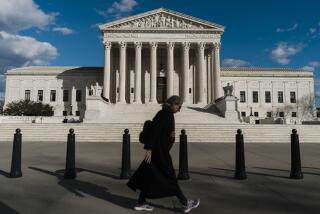Can Be Barred From Confronting Children in Pretrial Hearings : Molestation Suspects’ Rights Limited
- Share via
WASHINGTON — In a move to protect child victims of sex crimes, the Supreme Court ruled Friday that a child molestation suspect had no constitutional right to confront the young witnesses during a pretrial hearing.
The 6-3 decision overturned a Kentucky Supreme Court ruling that said that accused persons had a right to be present “at all phases” of the legal proceedings against them.
It was the second decision this year in which the justices limited the rights of persons accused of molesting children. In February, the high court said that a father charged with molesting his daughters had no right to inspect the confidential records of a child protective agency to see who had supplied information against him.
Special Protection
Attorneys who prosecute crimes against children said the two rulings show that the high court is willing to give young victims special protection in legal proceedings. But the decisions do not spell out how the court will view the growing practice of letting child victims give their court testimony on videotape or over closed-circuit television.
“This is a very encouraging first step because the court has recognized the rights of young victims,” said Penny Warren, an assistant attorney general in Kentucky. “It doesn’t solve all the problems, though.”
This case concerned a pretrial competency hearing in which a judge tried to determine whether the children--two girls, ages 8 and 7, and a 5-year-old boy--were capable of recounting their stories accurately. Sergio Stincer, the man accused of molesting the three while their mother was out shopping, was kept out of this hearing, although his lawyer attended.
Conviction Overturned
During a subsequent trial, two children testified against Stincer. He was convicted and sentenced to 20 years in prison. The state Supreme Court threw out his conviction, concluding that Stincer’s right to confront his accusers had been denied.
In reversing this ruling, Justice Harry A. Blackmun pointed out that Stincer and his attorney “had the opportunity for full and effective cross-examination of the two witnesses during the trial.” Therefore, his constitutional rights to confront his accusers “were not violated by his exclusion from the competency hearing,” Blackmun said.
Justices Thurgood Marshall, William J. Brennan Jr. and John Paul Stevens dissented. “Due process (of law) requires that (Stincer) be allowed to attend every critical stage of his trial,” Marshall wrote.
Thirty-three states have laws allowing child victims to testify via videotape or closed-circuit television. Although the court avoided comment on those procedures in this case (Kentucky vs. Stincer, 86-572), Kentucky’s Warren said that such methods may be viewed as constitutional as long as the accused and his attorney have some opportunity to cross-examine the child witnesses.
Junkyard Searches
In other actions, the court ruled that:
--Police officers may inspect auto junkyards without a search warrant. To cut down on auto thefts, the New York Legislature had approved a law authorizing such searches, but a New York court of appeals declared that the searches violated the Fourth Amendment ban on unreasonable searches. On a 6-3 vote, the justices disagreed, concluding that administrative searches in “closely regulated” businesses are legal (New York vs. Burger, 86-80).
--A labor union may be sued for failing to challenge racial discrimination by an employer against union members (Goodman vs. Lukens Steel, 85-1626).
More to Read
Sign up for Essential California
The most important California stories and recommendations in your inbox every morning.
You may occasionally receive promotional content from the Los Angeles Times.













